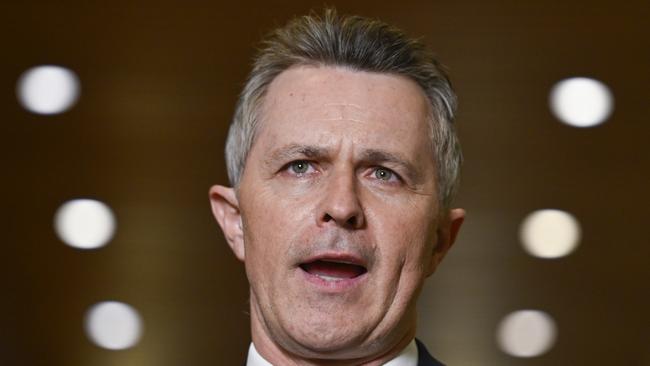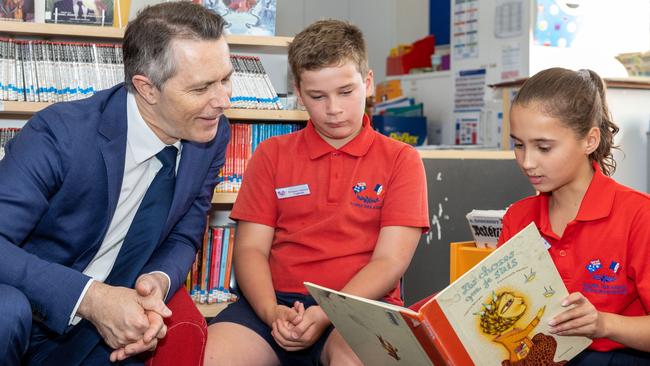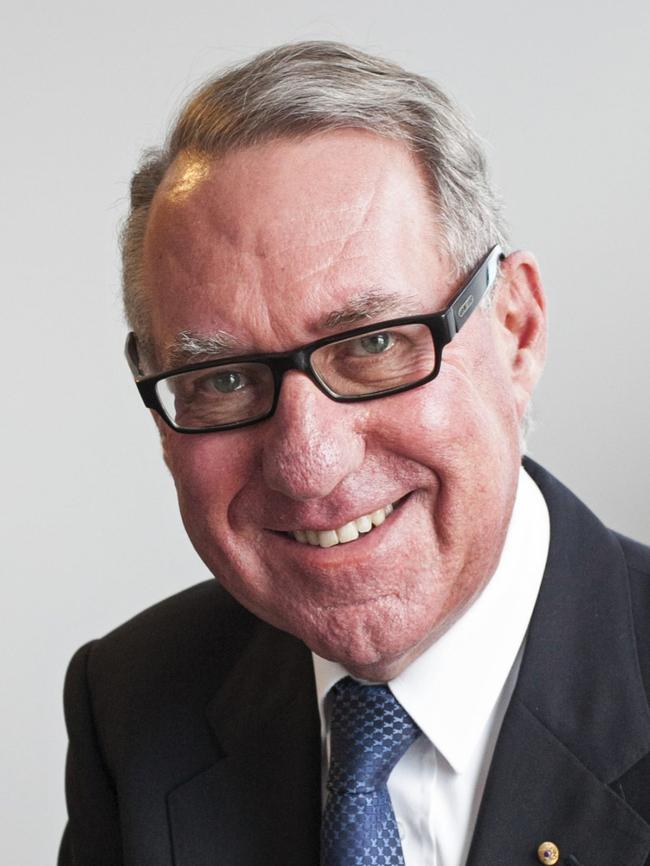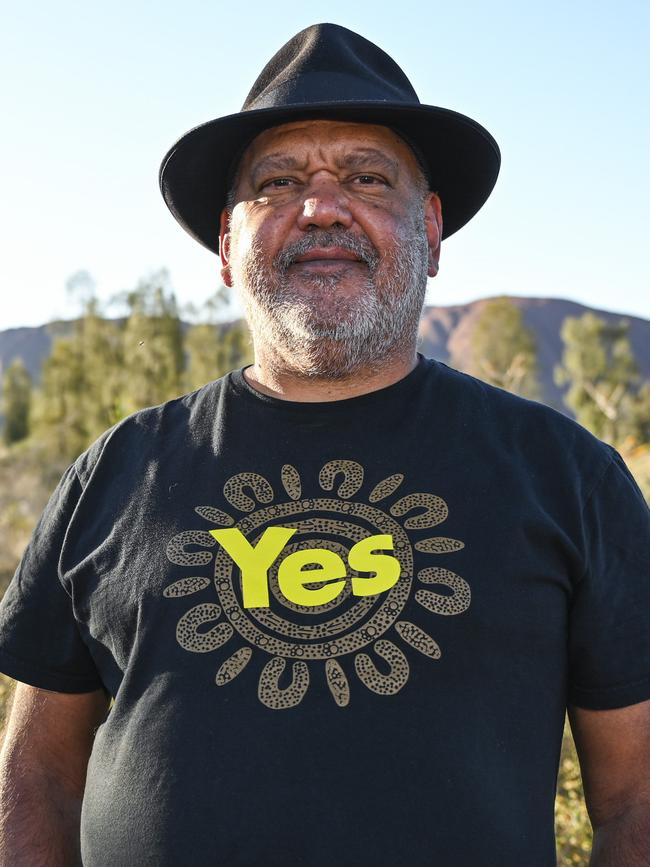Jason Clare’s ‘dollars ‘n’ sense’ drive for schools
Billions of dollars in missing ‘Gonski funding’ will flow into public schools from next year as the Albanese government fast-tracks education spending and embraces Noel Pearson’s explicit teaching reforms.

Billions of dollars in missing “Gonski funding’’ will flow into public schools from next year as the Albanese government fast-tracks education spending and embraces Noel Pearson’s explicit teaching reforms.
Spelling out his second-term ambitions, federal Education Minister Jason Clare has revealed his plans for an education integrity bill to improve children’s safety in childcare and stamp out migration fraud in the international education sector.
Mr Clare said he would consult school principals as well as Indigenous leader Mr Pearson – a champion of direct-instruction methods to improve student learning – in a review of the national curriculum.
Declaring his work to improve the education system was “only half done’’, Mr Clare said “big reform’’ was needed to upskill Australia’s future workforce.
“In 25 years, by 2050, we need a workforce where four out of five people have a tertiary qualification – it’s only three out of five people in the workforce today,’’ he said.
“That is an enormous challenge and a big shift. The kids who are in primary school now, who are born today, they’re the kids that are going to be part of that workforce so we’ve got to make sure we get their education right.’’
Mr Clare will bring forward the delivery of $16.5bn in bonus commonwealth funding for schools, which was missing from the forward estimates in the March federal budget.
“Not all of the bilateral agreements (with states) were signed before the budget was put to bed in March,’’ he said.
“But you’ll see all of that reflected in the next budget update, which would be MYEFO (the mid-year economic and fiscal outlook). That will give you (spending) for the next four financial years … the total number is $16.5bn over 10 years. We’re just finalising all of that now.’’

The Albanese government is still negotiating a funding and reform deal with Victoria, and has kept secret the fine print of bilateral agreements requiring state and territory governments to improve school attendance and results in return for the extra commonwealth cash.
Mr Clare said Western Australia, the Northern Territory, Tasmania and the ACT would receive extra funding from this year, while extra money would flow to Victoria, NSW, Queensland and South Australia from January next year.
He said the extra needs-based funding for schools – recommended in a landmark review by business leader David Gonski 14 years ago – would be spent on catch-up tutoring and student wellbeing initiatives, in an effort to improve student attendance rates that plunged after the Covid pandemic lockdowns.
“If we’re serious about tackling challenges with attendance and behaviour, then a big part of that is what we do in classrooms to help kids who fall behind,’’ he said.
“If school doesn’t make sense, you’re less likely to want to go.
“If you feel unwell, if you’ve got a whole bunch of mental health challenges, you’re less likely to want to turn up to school if school doesn’t have the wraparound supports you need to succeed there.’’

Mr Clare said WA would use its Gonski money to trial “full-service’’ schools with on-site medical support from doctors, pediatric nurses, psychologists, speech pathologists and occupational therapists.
“All those different supports can help a child and be the difference between whether they turn up or not, whether they finish school or not,’’ Mr Clare said.
He said he would call a meeting with state and territory education ministers in June or July to discuss national reforms, including solving teacher shortages and improving the governance of universities.
He said the national curriculum, which has been criticised by principals, Mr Pearson and the Coalition for its complexity, would be reviewed.
Mr Clare flagged consultation with: Mr Pearson, who has criticised the cross-curriculum priorities of Aboriginal and Torres Strait Islander history and culture, sustainability and Australia’s relationship with Asia embedded in every subject; and Australian Government Primary Principal Association president Pat Murphy, who has said the curriculum is “impossible to teach’’.
“I think the world of Noel,’’ Mr Clare said. “(The curriculum) has got to be reviewed this term. I’ll sit down and talk to (state and territory) ministers about it, but also Pat and Noel and all of the experts in the area.’’
Mr Clare said the Better and Fairer Schools Agreement with state and territory governments would require them to use evidence-based teaching methods, such as explicit instruction and the use of phonics to teach children to read.

“The reading wars are over,’’ he said. “Big states like NSW and Victoria have really burst out of the blocks when it comes to explicit teaching and … to make sure kids learn to read in the way that we know works.’’
In remarks that will upset universities, Mr Clare signalled the federal government might continue to rely on Ministerial Direction 111 to reduce the number of international student visas.
“Direction 111, as well as the increase in the visa fees to students, has helped us to reduce student visa applications by about 30 per cent this year, so that’s working,’’ he said. “I’m keeping a close eye on that, and I’ll work closely with Julian (Hill), who’s now the assistant minister for international education.’’
Mr Clare flagged new legislation to combine a regulatory crackdown on childcare to improve children’s safety, with integrity measures to prevent universities and training colleges being used as a backdoor to migration.
“In March, the government announced a series of reforms to strengthen integrity of the early education system, including measures that would prevent centres that aren’t up to scratch from expanding or from continuing to be able to access the childcare subsidy, and stopping bad actors in early education from being able to set up business in the NDIS – and some of that is going to require legislative reform,” he said.
Mr Clare said the government would encourage school leavers to consider apprenticeships and vocational training, as well as university. “We’re not going to be successful in hitting that 80 per cent (tertiary education) target in 25 years unless we break down that artificial barrier between TAFE and uni,’’ he said.
“It’s got to be easier for people to move between the two, to do a bit of both, to make the system more joined up.’’
Mr Clare said the new Australian Tertiary Education Commission would start work on an interim basis on July 1, before he introduced legislation later in the year. Should he stay in the portfolio for the next three years, Mr Clare will become Australia’s longest-serving federal education minister. His goal is to “open the doors of opportunity wider, helping to make sure that more young people finish school and get a crack at TAFE or university’’.
“Reform is hard everywhere, and in education it takes a long time before you see the impact of it,’’ he said. “A good education can change lives, and change the country.’’






To join the conversation, please log in. Don't have an account? Register
Join the conversation, you are commenting as Logout